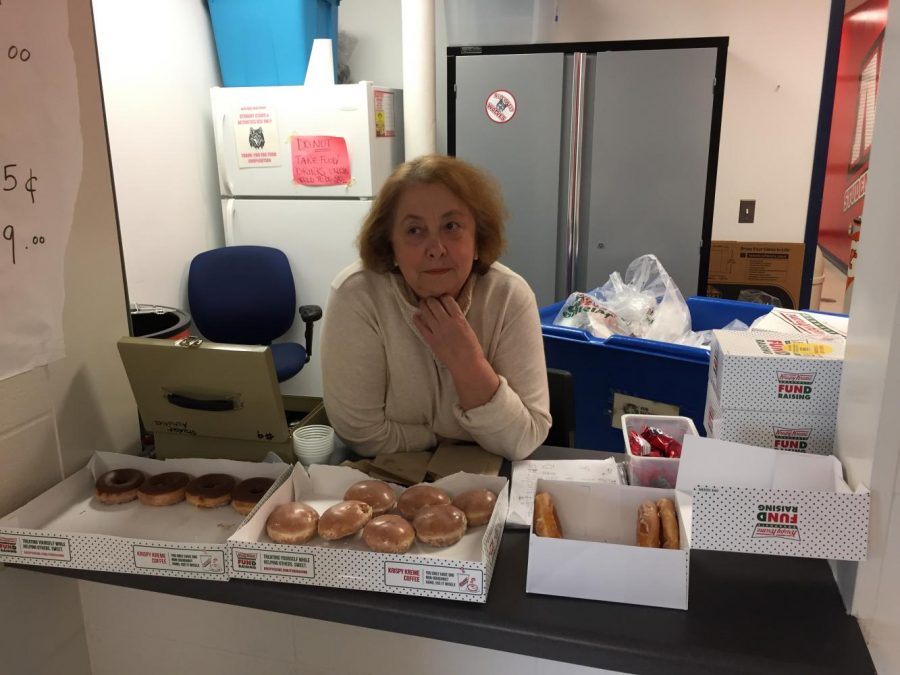The Soviet Union, Go Green Club, and Krispy Kreme Donuts: Tatyana Gulak
Oct 17, 2017
One could instantly recognize Go Green Club’s sponsor Tatyana Gulak in the halls of Niles West. While pushing her recycling gondola with a number of her club’s members trailing behind her like baby ducklings, Gulak is often heard humorously confronting teachers and students alike about their mistakes disposing paper and plastic.
“Everything we do is precise. No garbage is ever found in our bins; we separate paper, cardboard, bottles and cans effectively,” Gulak said.
Her work is never less than exemplary–she firmly leads by example and simultaneously provides her students with a sense of belonging.
“She won’t take no for an answer, we all know that. She’s driven and wants to help the kids here, and her heart is in the right place,” student activities assistant Kelly Adamovic said.
Gulak’s more motherly characteristics are a critical part of her personality; she raised three children of her own after moving to the United States in 1987.
“Mrs. T is more than just a staff member with superpowers,” alumnus and former Go Green Club member Matthew Kaleb said. “She is an icon in school, and I always considered her my mom while I was in the building. She always kept me in check and was always there for me when I needed her to be.”
Born to well-educated parents in Kharkiv, Ukrainian S.S.R., Gulak enjoyed a happy childhood. Her parents were university professors, a career path she would mirror in her own future as a high school teacher. Growing up in the former Soviet Union was a beautiful experience for her as her young mind enjoyed a golden era of domestic tranquility, relative economic stability, and a pleasant home environment.
Gulak defied social norms early in life by being politically active, something that was uncommon among children from educated families. She joined the Komsomol, the All-Union Leninist Young Communist League at 14 years old and expressed her fervent love for her nation, though she quickly became disillusioned.
“When I was young I was ready to die for revolution, and I believed anything the government told me. As I got older I realized it was all a lie,” Gulak said.
After finishing high school in Kharkiv she attended Moscow State Pedagogical University, Russia’s highest-ranking educational institution, from 1966 to 1972. Following that, she taught fourth through twelfth grade mathematics in Kharkiv until 1985, but soon had to leave the country as a political refugee.
By the late 1980s, the Soviet Union was changing. Crumbling from the inside out, plans for reform only encouraged the inevitable dissolution of the state. Although things were not looking well for the government, Gulak’s opportunities were just beginning to expand–she was in line to become principal of her school in only two to three years.
Although she was always loyal to her country, Gulak’s spouse was a dissident who spoke out against the government. Her home was searched twice by the KGB, and at one point, her husband went on a fifty day hunger strike to no avail.
Gulak had no desire to leave her native land, but knew that she did not want to raise three children alone while their father was a political prisoner. At first, the U.S.S.R. would not allow the family to leave, but the government drastically loosened their emigration policy just enough by the late-80s for them to seek political asylum in the United States.
In 1987 Gulak moved to Rogers Park with the rest of her family, supported by friends who had already lived in the U.S. Unlike the vast majority of other emigrants from the U.S.S.R. at that time, she had no desire to come to the United States.
“People here do not have their own language, they have no life. Many people who came from the Soviet Union were disappointed with America because they expected so much,” she said. “They thought gold grew on trees here, and they found nothing.”
Gulak felt the complete opposite way about coming to the United States. As she was expecting nothing more than shootings and crime, she was pleasantly surprised when she arrived.
“I was happy all the time. I expected people around me to get shot every day, but instead everyone I walked by said hello to me,” Gulak said.
Aside from raising two boys and a girl aged ten, eight, and four in a completely new society, she also had to overcome her language barrier.
Gulak formally studied the English language during her time in university, but she did not retain any of it. She learned English word by word while watching TV at home and attending Truman College for a year.
The considerable Russian speaking population in Rogers Park made her transition to living in the United States easier, but she was most focused on raising her children at home while her husband changed professions to support their family.
Originally a professor of political economics, her husband became a computer programmer because of his inability to speak English and lack of opportunity in his particular field in the U.S.
After living in Skokie for a few years they bought a house in Morton Grove in 1995. By this time her son was already a student at Niles West, and she often spent entire days helping out with theater and music activities at school. An employee noticed her consistent involvement at West and suggested that she might as well earn some money for her time by getting a job in the ELL Department.
She accepted the offer, and after working in the ELL Department for 16 years (2000-2016), she successfully retired. She still occasionally helps students with their school work.
“When I came to this school, Mrs. T helped me with math and social studies before I recycled with her. After I joined the club, she proved to be a really kind person and made recycling fun for us,” senior Ali Yousefi said.
Now, Go Green Club is Gulak’s first priority, and she tries to do as much as she can to mitigate the impact of climate change through the club’s work.
“First, I understand that climate change is real. We have to do as much as we can and very soon. I don’t have enough language, and I’m not that young to do much in America, but I’m willing to do whatever I can to make things better because it’s getting worse,” Gulak said.
She became the official sponsor of Go Green Club in 2006 with only two students signed up. Only a few weeks after they started, they had ten.
“Over the years we have grown to the point where we give out $300, $500, and even $1,000 scholarships to some students. Nobody helps with any of the money–we do it all with Krispy Kreme,” Gulak said with a wink, referencing the club’s popular Krispy Kreme donut fundraisers.
Though she plans on leaving Niles West after this school year, Gulak is concerned that the recycling program will not be up to par when she is gone. Recycling and environmental sustainability are not only important for Niles West, but for all of humanity, which is why Gulak feels the need to stress the importance of increased funding of recycling in the district.
“I have the privilege to do this once a week, but nobody else can spend this much time because they have to teach classes or have other responsibilities,” Gulak said. “In my opinion, the district should hire four people and pay them minimum wage two hours per day, four days a week. Otherwise it will be very hard.”
Thirty years after moving to the United States, Gulak still exhibits some of the patriotism she had for the Soviet Union as a child.
“Of course I love America; it’s my country. I’m not completely happy because I don’t like the government, but I’m glad I came. My kids have more opportunity here than in if we stayed in Ukraine,” she said.
This proved to be true, as all three of her children have college degrees, and her daughter holds a PhD in political science, psychology, and criminal justice.
Mrs. Gulak, or Ms. T, as the students at West call her, encapsulates the indestructible spirit of immigrants from the Eastern Bloc here in our own high school.
Her passion to serve District 219 with her poorly funded, self-run recycling program is rooted in her insatiable desire to make something out of nothing, which is something she hopes students at Niles West understand.
“I divide people into two groups, builders and users. I want to see builders succeed and users fail. Students in this school can go very high with all the opportunities they have, and they should use them as much as they can, while they can,” Gulak said.
After dedicating her life to education, one thing is certain: Gulak has positively impacted hundreds of students who have had her as a teacher or club sponsor.
“The one thing I will never forget her saying is, ‘What would I do if I retire? Go Green Club is my life.’ After my three years at Niles West, I racked up more community service hours than I needed,” Kaleb said. “My goal after that was to help her finish her remarkable fight.”
And so, armed with plastic bins and boxes of donuts, Gulak’s youthful revolutionary spirit lives on through recycling.





JulieAnn Villa • Oct 19, 2017 at 11:19 AM
Thank you for writing this feature of the wonderful Mrs. T! I had no idea of the many details of her life, only that she makes Niles West a better place every day.
t • Oct 18, 2017 at 7:16 PM
Thank you for this beautiful story, Aleksandar!